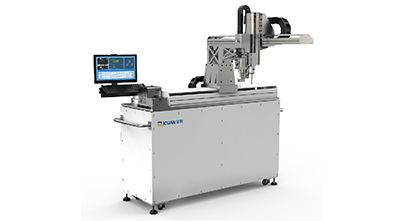In modern industrial production,automatic screw machines,with their advantages of effectiveness and stability,have become important equipment for many enterprises to enhance assembly efficiency.However,the tightening accuracy,as a key indicator for measuring its performance,is influenced by a combination of multiple factors.Understanding these influencing factors is of great significance for optimizing equipment performance and ensuring product assembly quality.
The mechanical structure is the fundamental factor affecting the tightening accuracy.The precision and wear degree of the transmission components of an automatic screw machine,such as lead screws and guide rails,directly affect the accuracy of the screw tightening position.If there are manufacturing errors in the lead screw or it wears out after long-term use,it will cause a positional shift when the screw is tightened.Insufficient straightness or poor lubrication of the guide rail can also cause the screw machine to vibrate and shake during operation,thereby affecting the tightening accuracy.In addition,the structural design of the tightening shaft of the screw machine is equally crucial.The precision of the bearings inside and the rigidity of the torque transmission components both have a significant impact on the stability and accuracy of the torque output.Bearings with lower precision are prone to radial runout during operation,resulting in unstable torque output and causing deviations in the tightening force of screws.

The inherent characteristics of screws themselves should not be overlooked either.The specifications,materials and surface quality of screws will all affect the tightening accuracy.Screws of different specifications,such as differences in length,diameter and pitch,will result in different required tightening torque and rotation numbers.If the parameter Settings of the screw machine do not match the actual screw specifications,it will inevitably lead to a decrease in tightening accuracy.The material of the screw determines its hardness and toughness.Screws with higher hardness require greater torque to be tightened.If the torque setting is insufficient,it will cause the screw to loosen.However,screws made of too soft material are prone to stripped threads under excessive torque.In addition,the roughness of the screw surface,the presence of oil stains or impurities will change the friction force between the screw and the screw hole,affecting the torque transmission during the tightening process and resulting in the actual tightening effect not matching the set value.
The control system is the core for ensuring the accuracy of tightening.The control system of the automatic screwdriver is responsible for accurately controlling parameters such as torque,rotational speed and the number of tightening turns.If the sensor accuracy of the control system is insufficient and cannot accurately detect torque and Angle,it will be difficult to achieve precise control.For instance,if the sensitivity of the torque sensor is low,it may cause the system to not stop working even when the screw has reached the appropriate tightening torque,resulting in over-tightening.Meanwhile,the algorithm and software program of the control system are also of vital importance.An optimized algorithm can dynamically adjust the torque and rotational speed based on the real-time tightening status of the screws,ensuring the stability and accuracy of the tightening process.However,if the program design is unreasonable,parameter fluctuations or misjudgments may occur,affecting the tightening accuracy.
The operating environment can also have an impact on the tightening accuracy.Environmental factors such as temperature and humidity can alter the physical properties of the mechanical components of a screw machine and the material characteristics of the screws.In high-temperature environments,the viscosity of the lubricating oil for screw machines decreases,and the lubrication effect deteriorates,which will accelerate the wear of mechanical components.In a humid environment,screws are prone to rust,increasing the resistance to tightening and causing unstable torque output.In addition,factors such as electromagnetic interference and vibration within the workshop may also affect the normal operation of the control system,interfere with the transmission of sensor signals,and cause deviations in tightening accuracy.